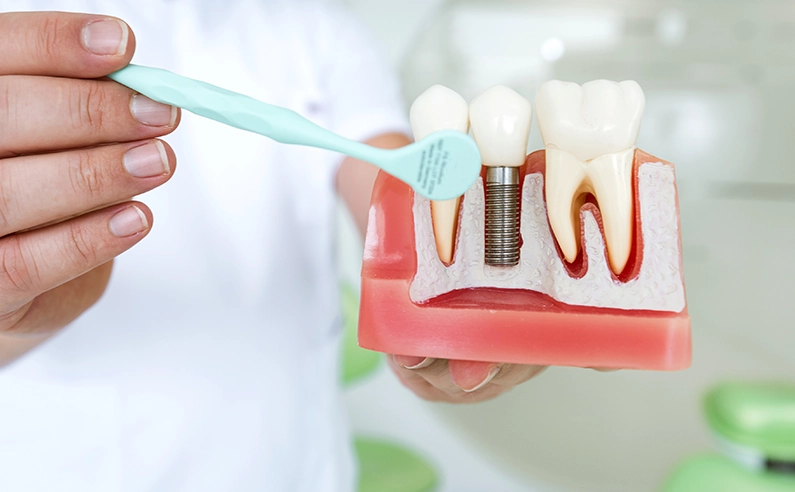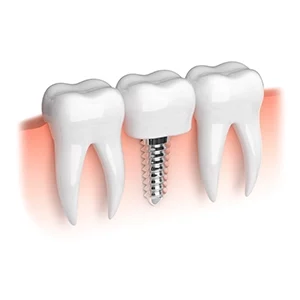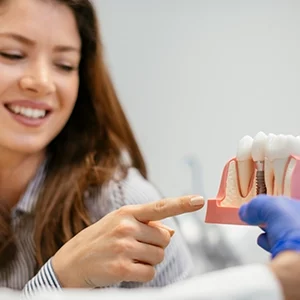Tooth loss is a common problem, affecting about half of the population. Missing teeth can impact your ability to eat and speak and can harm your confidence.
However, at Mount Zion Dental, there are several options for tooth replacement from dentures to dental bridges to dental implants.
According to the American Dental Association, dental implants are the gold standard because they look, feel, and function like natural teeth. Unfortunately, they are also the most expensive. In this article, we’ll explain what you need to know about the cost of a single dental implant without insurance.
What is a single-tooth implant?
Before exploring the cost of a single-tooth dental implant , it’s important to understand exactly what we’re talking about. Unlike traditional dentures or a dental bridge, a dental implant involves the surgical placement of a titanium post into the jawbone. This post acts as a tooth root, creating a sturdy foundation for the replacement tooth and offering a permanent, natural-looking solution for missing teeth.
What is the average cost of a single-tooth implant?
The cost of a single tooth implant can vary significantly, influenced by a multitude of factors.
On average, however, individuals can expect to invest anywhere from $3,000 to $6,000 for a single tooth implant. This cost includes the implant surgery, the abutment (connector), and the crown (artificial tooth).
It’s crucial to note that these figures are approximate and can vary based on geographical location, the expertise of the dental professional, and the type of materials used.
Factors Influencing Single Tooth Implant Cost
The cost of a single-tooth implant can be influenced by various factors, reflecting the personalized nature of dental care and the specific needs of each patient. Here are the key factors that impact the cost of a single-tooth implant:
Implant Material
The material of the implant fixture itself is a significant cost factor. Titanium implants are commonly used due to their durability and biocompatibility. Some individuals may opt for alternative materials, such as zirconia, which can be pricier.
Abutment and Crown Material
The materials used for the abutment (connector) and crown (artificial tooth) that sit atop the implant can affect the overall cost. High-quality materials, such as porcelain or ceramic, may be more expensive but offer aesthetic benefits.
Implant Dentist’s Experience and Skill
The experience and skill of the implant dentist performing the procedure can impact the cost. Experienced and highly skilled professionals may charge higher fees, reflecting their expertise and the likelihood of a successful outcome.
Geographical Location
The cost of living and demand for dental services in a particular region can influence the overall cost of dental procedures, including single-tooth implants. Urban areas and regions with higher living expenses may have higher dental care costs.
Diagnostic and Pre-Implantation Procedures
Diagnostic procedures, such as X-rays, CT scans, and impressions, are necessary before implant placement. Any additional treatments required, such as bone grafting or sinus lifts, will contribute to the overall cost.
Dental Insurance Coverage
The presence and extent of dental insurance coverage play a crucial role in determining out-of-pocket costs. Insurance plans may cover a portion of the implant procedure or related components, such as the crown. Lack of insurance coverage can result in higher personal expenses.
Post-operative care and Follow-Up
The cost of post-operative care, including follow-up appointments and any necessary adjustments, should be considered. Comprehensive aftercare contributes to the success and longevity of the single-tooth implant.
Additional Costs
Additional costs, such as anesthesia fees, facility fees, and miscellaneous expenses, can contribute to the overall cost of the single-tooth implant procedure. These costs may vary based on the specific circumstances of the implant surgery.
Understanding these factors and discussing them with the implant dentist during the consultation process can help individuals obtain a clear picture of the anticipated costs associated with a single-tooth implant.
How dental insurance can influence costs?
Dental insurance can have a significant impact on the cost of dental implants, potentially reducing the financial burden for individuals seeking this restorative dental procedure. However, it’s essential to understand that not all dental insurance plans provide coverage for dental implants, and the extent of coverage can vary widely among plans.
Our office staff will contact your dental insurance provider to determine your coverage on dental implants. If your provider does not cover the procedure or if you do not have dental insurance, we will explain our financing options. While these will not reduce the cost of the procedure, they will allow you to break the fee up into manageable payments.
When to consult an Implant dentist
Consulting with an implant dentist is essential when you experience tooth loss or anticipate the need for a dental implant. Here are situations in which you should consider scheduling a consultation with an implant dentist:
- Tooth loss due to decay/trauma
- Planned tooth extraction
- Existing dentures or dental bridge
- The desire for a permanent tooth replacement
- Jawbone loss concerns
However, it’s important to note that consultation does not necessarily mean immediate implant placement. The initial consultation allows the dentist to gather information, discuss your options, and create a personalized plan based on your needs and circumstances.
Dr. Cook at Mount Zion Dental in North Miami Beach, FL has the experience and expertise to help you find the best tooth replacement option. She will work with you to make sure that you understand your options and are satisfied with your treatment.
Single Tooth Implant FAQs
If you have questions about single-tooth dental implants or other tooth replacement options at Mount Zion Dental, Dr. Cook will be happy to answer them. Below are a few of the most common ones that we hear:
How long does a single tooth implant last?
Dental implants are a long-term solution for tooth loss. In many cases, this device can last a lifetime with proper care and maintenance. Regular dental check-ups and proper oral hygiene are important for ensuring the longevity of the implant.
How painful is a single-tooth implant?
While discomfort is expected during the recovery period, the actual implant surgery is performed under local anesthesia, ensuring a pain-free experience. Most individuals can manage post-operative discomfort with OTC pain relievers.
How successful is a single-tooth implant?
Single-tooth implants boast a high success rate, often exceeding 95%. Success depends on factors such as the patient’s overall health, adherence to post-operative care, and the skill of the implant dentist.
Does a dental implant look natural?
Yes, dental implants are designed to replicate the look and feel of natural teeth. The crown is custom-made to match the color, shape, and size of adjacent teeth, providing a seamless and natural appearance.



